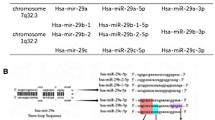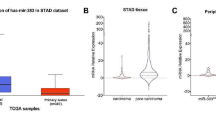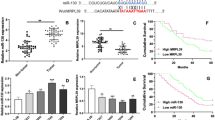Abstract
MicroRNAs (miRNAs) are implicated in various cancer-relevant cellular processes, including cell proliferation, migration, invasion, and angiogenesis. However, the function of miRNAs in hepatocellular cancer (HCC) has not been fully clarified. This study aimed to investigate the role of miR-1178-3p in HCC metastasis and try to reveal the potential mechanism. In the present study, we found that miR-1178-3p was down-regulated, while TBL1XR1 was up-regulated in HCC cancer tissues by bioinformatics analysis and RT-PCR. We further confirmed the connection of miR-1178-3p and TBL1XR1 using dual-luciferase reporter (DLR) assay. Moreover, gain- and loss-of-function experiments demonstrated that overexpress miR-1178-3p inhibited cell proliferation, migration, and invasion in HCC cells and reduced the xenograft tumor growth and angiogenesis by regulating the TBL1XR1/PI3K/Akt axis. Our results indicated that the novel identified miR-1178-3p functions as a tumor suppressor in HCC through regulating TBL1XR1/PI3K/Akt pathway, and these findings could be a valid molecular target for liver cancer therapy.






Similar content being viewed by others
Availability of data and materials
The data sets and supporting materials for the current study are available from the corresponding author on reasonable request.
References
Forner A, Reig M, Bruix J. Hepatocellular carcinoma. Lancet. 2018;391:1301–14.
Zeng H, Chen W, Zheng R, et al. Changing cancer survival in China during 2003–15: a pooled analysis of 17 population-based cancer registries. Lancet Glob Health. 2018;6:e555–67.
Castelli G, Pelosi E, Testa U. Liver cancer: molecular characterization, clonal evolution and cancer stem cells. Cancers (Basel). 2017;9:127.
Liu CY, Chen KF, Chen PJ. Treatment of liver cancer. Cold Spring Harb Perspect Med. 2015;5:a021535.
Akateh C, Black SM, Conteh L, et al. Neoadjuvant and adjuvant treatment strategies for hepatocellular carcinoma. World J Gastroenterol. 2019;25:3704–21.
Coffelt SB, Kersten K, Doornebal CW, et al. IL-17-producing gammadelta T cells and neutrophils conspire to promote breast cancer metastasis. Nature. 2015;522:345–8.
van Weverwijk A, Koundouros N, Iravani M, et al. Metabolic adaptability in metastatic breast cancer by AKR1B10-dependent balancing of glycolysis and fatty acid oxidation. Nat Commun. 2019;10:2698.
Benedicto A, Romayor I, Arteta B. CXCR4 receptor blockage reduces the contribution of tumor and stromal cells to the metastatic growth in the liver. Oncol Rep. 2018;39:2022–30.
Wu SG, Chang TH, Liu YN, Shih JY. MicroRNA in lung cancer metastasis. Cancers (Basel). 2019;11:265.
Jonas S, Izaurralde E. Towards a molecular understanding of microRNA-mediated gene silencing. Nat Rev Genet. 2015;16:421–33.
Labib PL, Goodchild G, Pereira SP. Molecular pathogenesis of cholangiocarcinoma. BMC Cancer. 2019;19:185.
Zhou Y, Li S, Li J, Wang D, Li Q. Effect of microRNA-135a on cell proliferation, migration, invasion, apoptosis and tumor angiogenesis through the IGF-1/PI3K/Akt signaling pathway in non-small cell lung cancer. Cell Physiol Biochem. 2017;42:1431–46.
Zhao X, Liu S, Yan B, Yang J, Chen E. MiR-581/SMAD7 axis contributes to colorectal cancer metastasis: a bioinformatic and experimental validation-based study. Int J Mol Sci. 2020;21:6499.
Shen SJ, Song Y, Ren XY, et al. MicroRNA-27b-3p promotes tumor progression and metastasis by inhibiting peroxisome proliferator-activated receptor gamma in triple-negative breast cancer. Front Oncol. 2020;10:1371.
Nemlich Y, Besser MJ, Schachter J, Markel G. ADAR1 regulates melanoma cell invasiveness by controlling beta3-integrin via microRNA-30 family members. Am J Cancer Res. 2020;10:2677–86.
Qin X, Zhang J, Lin Y, Sun XM, Zhang JN, Cheng ZQ. Identification of MiR-211-5p as a tumor suppressor by targeting ACSL4 in hepatocellular carcinoma. J Transl Med. 2020;18:326.
Liu H, Bi J, Dong W, Yang M, Shi J, Jiang N, Lin T, Huang J. Invasion-related circular RNA circFNDC3B inhibits bladder cancer progression through the miR-1178-3p/G3BP2/SRC/FAK axis. Mol Cancer. 2018;17:161.
Cao Z, Xu J, Huang H, Shen P, You L, Zhou L, Zheng L, Zhang T, Zhao Y. MiR-1178 promotes the proliferation, G1/S transition, migration and invasion of pancreatic cancer cells by targeting CHIP. PLoS ONE. 2015;10:e0116934.
Wang LQ, Deng AC, Zhao L, Li Q, Wang M, Zhang Y. MiR-1178-3p promotes the proliferation, migration and invasion of nasopharyngeal carcinoma Sune-1 cells by targeting STK4. J Biol Regul Homeost Agents. 2019;33:321–30.
Zhang T, Liu C, Yu Y, et al. TBL1XR1 is involved in c-Met-mediated tumorigenesis of human nonsmall cell lung cancer. Cancer Gene Ther. 2020;27:136–46.
Gu JF, Fu W, Qian HX, et al. TBL1XR1 induces cell proliferation and inhibit cell apoptosis by the PI3K/AKT pathway in pancreatic ductal adenocarcinoma. World J Gastroenterol. 2020;26:3586–602.
Sun X, Dongol S, Qiu C, et al. miR-652 promotes tumor proliferation and metastasis by targeting RORA in endometrial cancer. Mol Cancer Res. 2018;16:1927–39.
Chang RM, Xiao S, Lei X, Yang H, Fang F, Yang LY. miRNA-487a promotes proliferation and metastasis in hepatocellular carcinoma. Clin Cancer Res. 2017;23:2593–604.
Cao Z, Xu J, Huang H, et al. MiR-1178-3p promotes the proliferation, G1/S transition, migration and invasion of pancreatic cancer cells by targeting CHIP. PLoS ONE. 2015;10:e0116934.
Cao Q, Wang Z, Wang Y, et al. TBL1XR1 promotes migration and invasion in osteosarcoma cells and is negatively regulated by miR-186-5p. Am J Cancer Res. 2018;8:2481–93.
Zhou Q, Wang X, Yu Z, et al. Transducin (beta)-like 1 X-linked receptor 1 promotes gastric cancer progression via the ERK1/2 pathway. Oncogene. 2017;36:1873–86.
Menon SS, Guruvayoorappan C, Sakthivel KM, Rasmi RR. Ki-67 protein as a tumour proliferation marker. Clin Chim Acta. 2019;491:39–45.
Zheng TL, Li DP, He ZF, Zhao S. miR-145 sensitizes esophageal squamous cell carcinoma to cisplatin through directly inhibiting PI3K/AKT signaling pathway. Cancer Cell Int. 2019;19:250.
Funding
The present study was supported by the National Natural Science Foundation of China (No. 81373169).
Author information
Authors and Affiliations
Contributions
Contributions: (I) Conception and design: H Liu; (II) Administrative support: H Liu; (III) Provision of study materials or patients: Q Pan; (IV) Collection and assembly of data: ZG Shao and YJ Zhang; (V) Data analysis and interpretation: Q Pan; (VI) Manuscript writing: Q Pan; (VII) Final approval of manuscript: All authors.
Corresponding author
Ethics declarations
Conflict of interest
The authors declare that they have no competing interests.
Ethics approval and consent to participate
Written informed consent was obtained from all patients, and the study protocol was approved by the Ethics Committee of First Hospital of China Medical University, the approval number: AF-OG-03-1.0-02. All animal research were carried out following approval by the Institutional Animal Care and Use Committee of First Hospital of China Medical University.
Additional information
Publisher's Note
Springer Nature remains neutral with regard to jurisdictional claims in published maps and institutional affiliations.
Rights and permissions
About this article
Cite this article
Pan, Q., Shao, Z., Zhang, Y. et al. MicroRNA-1178-3p suppresses the growth of hepatocellular carcinoma by regulating transducin (beta)-like 1 X-linked receptor 1. Human Cell 34, 1466–1477 (2021). https://doi.org/10.1007/s13577-021-00565-5
Received:
Accepted:
Published:
Issue Date:
DOI: https://doi.org/10.1007/s13577-021-00565-5




